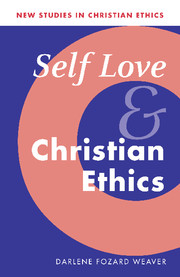2 - Self love in Christian ethics
Published online by Cambridge University Press: 12 November 2009
Summary
As historians of ethics have noted, since the eighteenth century theological ethical attention has shifted away from the divine–human relation to interpersonal human relations. As the classical coordination of self love with love for God receded, so, too, did many resources for thinking about the self's relation to the divine as the central sphere of moral activity. Rather, concern for the neighbor became the province of ethics. The person's interior life and religious status before God were disentangled from the person's relation to others, and were distinguished more sharply from public activity and relations. While an historical and causal account of this shift lies beyond the scope of this project, we should note several important aspects of this shift. First, it signaled that the self's relation with God should not instrumentalize the neighbor. Second, it testifies to divine intentions that do not concern and may even thwart individual human flourishing. Third, and somewhat ironically, it re-cast the self's relation with God in terms of an existential decision or posture. This reconception of faith is part of a larger apologetic project which shifted attention away from revealed religion toward forms of natural religion which tended to emphasize the moral dimensions of Christianity and render faith as an aid to living well. While positions which exemplify this shift vary considerably, the self's relation to the divine often was re-thought either in terms of dependence (Schleiermacher) or freedom (Ritschl).
- Type
- Chapter
- Information
- Self Love and Christian Ethics , pp. 44 - 80Publisher: Cambridge University PressPrint publication year: 2002



